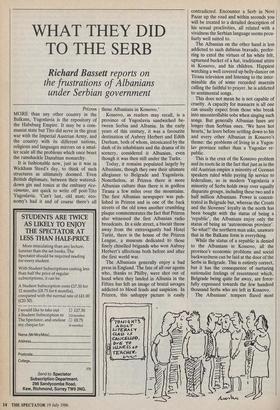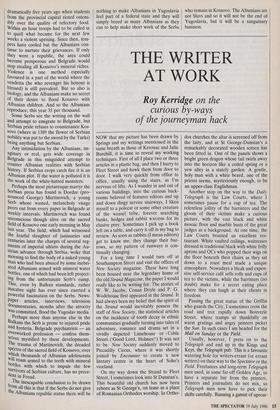WHAT THEY DID TO THE SERB
Richard Bassett reports on the frustrations of Albanians under Serbian government
Prizren MORE than any other country in the Balkans, Yugoslavia is the repository of the Habsburg Empire. It may be a com- munist state but Tito did serve in the great war with the Imperial Austrian Army, and the country with its different nations, religions and languages mirrors on a smal- ler scale all the problems which once beset the ramshackle Danubian monarchy.
It is fashionable now, just as it was in Wickham Steed's day, to think of such structures as ultimately doomed. Even British diplomats, between their watered- down gin and tonics at the embassy rice- vimento, are quick to write off post-Tito Yugoslavia. 'Can't last, old man; eco- nomy's had it and of course there's all those Albanians in Kossovo.'
Kossovo, as readers may recall, is a province of Yugoslavia sandwiched be- tween Serbia and Albania. In the early years of this century, it was a favourite destination of Aubrey Herbert and Edith Durham, both of whom, intoxicated by the dash of its inhabitants and the drama of its scenery, considered it Albanian, even though it was then still under the Turks.
Today, it remains populated largely by Albanians, though they owe their ultimate allegiance to Belgrade and Yugoslavia. Nonetheless, at Prizren there is more Albanian culture than there is in godless Tirana a few miles over the mountains. The first Albanian newspaper was pub- lished in Prizren and in one of the back streets of the old town another crumbling plaque commemorates the fact that Prizren also witnessed the first Albanian radio broadcasts. In a side street, a biscuit throw away from the extravagantly bad Hotel Turist, there is the house of the Prizren League, a museum dedicated to those finely chiselled brigands who won Aubrey Herbert's affections both before and after the first world war.
The Albanians generally enjoy a bad press in England. The fate of all our agents who, thanks to Philby, were shot out of hand when they landed in Albania in the Fifties has left an image of brutal savages addicted to blood feuds and suspicion. In Prizren, this unhappy picture is easily contradicted. Encounter a Serb in Novi Pazar up the road and within seconds you will be treated to a detailed description of his sexual proclivities, all related with a vividness the Serbian language seems pecu- liarly well suited to.
The Albanian on the other hand is less addicted to such dubious bravado, prefer- ring to extol the virtues of his white felt, upturned bucket of a hat, traditional attire in Kossovo, and his children. Happiest watching a well covered up belly-dancer on Tirana television and listening to the inter- minable din of some recorded muezzin calling the faithful to prayer, he is addicted to sentimental songs.
This does not mean he is not capable of cruelty. A capacity for massacre is all one can usually expect from those who break into uncontrollable sobs when singing such songs. But generally Albanian fuses are longer than Serbian ones. 'We have hot hearts,' he leers before settling down to his and every other Albanian in Kossovo's theme: the problems of living in a Yugos- lav province rather than a Yugoslav re- public.
This is the crux of the Kossovo problem and its roots lie in the fact that just as in the old Austrian empire a minority of German speakers ruled while paying lip service to federalism, so in modern Yugoslavia a minority of Serbs holds sway over equally disparate groups, including these two and a half million Albanians. Power is concen- trated in Belgrade but, whereas the Croats and the Slovenes' loyalty in the north has been bought with the status of being a `republic', the Albanians enjoy only the status of being an 'autonomous province'. `So what?' the northern man asks, unaware that in the Balkans form is everything.
While the status of a republic is denied to the Albanians in Kossovo, all the province's economic problems and social backwardness can be laid at the door of the Serbs in Belgrade. This is entirely correct, but it has the consequence of nurturing nationalist feelings of resentment which, Belgrade being quite far away, are force- fully expressed towards the few hundred thousand Serbs who are left in Kossovo.
The Albanians' tempers flared most dramatically five years ago when students from the provincial capital rioted ostens- ibly over the quality of refectory food. Within an hour troops had to be called in to quell what became for the next few weeks a violent uprising. Since then, tem- pers have cooled but the Albanians con- tinue to nurture their grievances. If only they were a republic, the area could become prosperous and Belgrade would stop stealing all Kossovo's mineral riches. Violence is one method especially favoured in a part of the world where the vendetta (he who revenges his honour is blessed) is still prevalent. But so also is biology, and the Albanians make no secret of their desire to flood Kossovo with Albanian children. And so the Albanians reproduce; this year 35 per thousand.
Some Serbs see the writing on the wall and attempt to emigrate to Belgrade, but Serbian pride refuses to countenance Kos- sovo (where in 1389 the flower of Serbian nobility was put to the sword by the Turks) being anything but Serbian.
Any intimidation by the Albanians, im- aginary or real, gets wide coverage in Belgrade in this misguided attempt to counter Albanian realities with Serbian history. If Serbian crops catch fire it is an Albanian plot. If the water is polluted it is the work of the white-hatted monsters.
Perhaps the most picturesque martyr the Serbian press has found is Dordze- (pro- nounced George) Martinovich, a young Serb whose wasted, melancholy visage peers out from every paper in Belgrade at weekly intervals. Martinovich was found unconscious though alive on the sacred field of Kossovo one early morning in May last year. The field, which had witnessed the fearful slaughter of janissaries and centuries later the charges of several reg- iments of imperial uhlans during the Au- strian advance through Serbia, woke that morning to find the body of a naked young man who had been abused by some inebri- ated Albanians armed with mineral water bottles, one of which had been left project- ing from the unfortunate Serb's rump. This, even by Balkan standards, rather macabre sight has ever since exerted a Powerful fascination on the Serbs. News- paper articles, interviews, television documentaries, months after the atrocity was committed, flood the Yugoslav media. Perhaps more than anyone else in the Balkans the Serb is prone to injured pride and hysteria. Belgrade psychiatrists — an overworked profession — confess them- selves mystified by these developments. The trauma of Martinovich, the dreaded spectre of the sacred field of Kossovo, over which thousands of Albanian adolescents will roam armed to the teeth with mineral bottles with which to impale the few survivors of Serbian culture, has no prece- dent in Freud. The inescapable conclusion to be drawn from all this is that if the Serbs do not give the Albanians republic status there will be nothing to make Albanians in Yugoslavia who remain in Kossovo. The Albanians are feel part of a federal state and they will not Slays and so it will not be the end of simply breed as many Albanians as they Yugoslavia, but it will be a sanguinary can to help make short work of the Serbs business.



















































 Previous page
Previous page